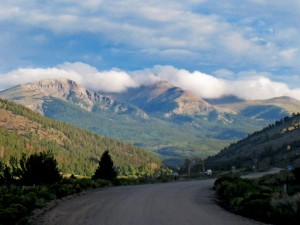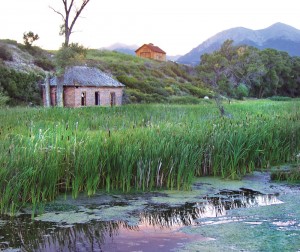By Slim Wolfe
I live in one of the Southwest’s raggedy towns, which suits me just fine, because it’s as far away as a person can get from the American dream of straight streets, neat little boxes, well-kept lawns and mortgages. There was a tradition of creative hard-scrabble building here which must jar the eye of any first-time visitor from the outside world of “normalcy”; odd shapes, used materials, piles of salvage, sometimes mislabeled as Blight. The place is as flat and barren as most of the San Luis Valley: no streams, nothing that grows to more than waist height, a habitat shared by rabbits and hares, prairie dogs, ant hills and a few birds.
One doesn’t see many of these “poverty-gulch subdivisions” north of Poncha Pass. Maybe they’re just more visible in the flat desert south of that Hispanic divide, but maybe they are an unintended consequence of the gringo conquest of 1848 which must have marginalized many of the original Spanish-speaking settlers. The comparatively unappealing real estate in the northern part of the Valley is also now a haven for the poorer element of the Anglo population, sometimes called “trailer trash” or just rednecks. I like my own little neighborhood because it has fewer trailers and modulars and more creative scrappiness. One thing we all seem to have in common is that we’re too busy with the general course of existence to make much of an effort to make a pretty picture for the drive-by world, the folks in spiffy vans and RV’s who don’t bother to stop unless the kids or the dogs have urgent needs.
A lot of the southwest is spotted with these barrios wherever they can squeeze in between farm-and-ranch operations, a reminder of class divisions in an increasingly rigid economic structure. To my eye, a squat white cracker-box is one of the world’s uglier phenomena but old-fashioned board-and -batten or adobe construction seem to be luxuries most modern folks can’t manage. Anything that grabs the eye and pulls it away from the natural view of mountains and valleys might be called a blight, and flat white is the worst offender, but flat white seems to be multiplying faster than the rabbits around here.
Even my own little “desolation row” subdivision is starting to take on a more boxy appearance. Some people who had outside jobs or sudden inheritances have bought conventional materials and employed conventional builders, even made conventional accommodations with codes and county bureaucrats. One lifelong ne’er-do-well, now well past 65 and nearly toothless, has suddenly been able to fulfill his dream of a small fortress-cum-growhole which is shaping up to be the closest thing we’ve had to solid foursquare normality in all our thirty-plus years. There’s one other new “high-rise” in the neighborhood, which at least has some visual interest, and a rash of little stuff to fit smaller budgets. There’s been wheeling and dealing in micro real estate, and squabbles and complaints to the authorities, who probably wish they could take out this bit of headache with a platoon of bulldozers. All this, the unintended consequences of a plat of vacant lots which were given as door-prizes to visitors to the 1964 Seattle World’s Fair or, if you take in the bigger picture, the unintended consequence of the confluence of two expanding economic empires, loosely defined as Hispanic and Anglo, which began to fill this loosely defined economic vacuum a couple of centuries ago. I’m thankful that I haven’t been hemmed in by upscale or even middle-scale housing, or been invited to Tupperware or ATV parties, but the desolation of Desolation Row is long gone.
As one drives southward from here and into New Mexico, one is more likely to see more homesteads and barrios built with more traditional materials which blend better, visually and chemically, with the landscape. There was a time when societies were motivated to lend a hand to the homesteaders, but the focus has changed to loans for instant housing and college coursework, which seems like a clear case of putting the cart before the horse, promoting an economy based on more and more dependence on institutions. Maybe there’s not much point to all this hindsight, but I’m still possessed by the notion that those institutions we have set up would have served us better had they not been oriented to private profit and exploitation of wage earners.
For a grasp of the bigger picture of unintended consequences I suggest a book I found at the library: 1493: Uncovering the World Columbus Created by Charles C. Mann. I didn’t know that the Leadville silver boom was a bit of a piker compared to the wild-west anarchy of Potosi, Bolivia, which carted silver to the west coast of Mexico and thence the world, in the 1500s. I didn’t know the extent of human and commercial traffic which sprang up across the Pacific, or that Asian slave labor dug up enough guano from an island off the Chilean coast to change the course of European agriculture. The vast volume of commerce and exploitation which was carried on the backs of animals or in the holds of canvas powered ships staggers the mind.
Modern eyes look at a landscape without paved roads and bright lights and imagine it’s an economic wasteland. They can’t imagine life without supermarkets and racks of DVDs, or ready-made houses with an easy payment plan. Farm kids at the start of the industrial revolution, or in remote places, were described as industrious and cheerful, though work was hard and benefits were few. Simple tales like “Robinson Crusoe” or “The Three Musketeers” fed their imaginations; travelling storytellers and dancing-masters camped out in farmhouse attics and engaged them with the ways of the world. Our brave new world of mouse-pushing and prosperity chasing is a world of disengagement from the here and now, addiction to fantasy, but it’s brought us a consequence of dissatisfaction and alienation. Forty years ago, we were reasonably expected to put away the Batman costumes by age ten or so and move on to more challenging stuff. Lately, Batman is targeting the 30-year-old market. Maybe we ought to be less worried about the debt crisis and more concerned about the state of our gene pool. We’re all becoming lords and robber-barons; the concept of material return for outlay of effort has gone the way of the pack-animal, but there’s damned little to justify entitlement. Those of us who were inspired by the visible history of past pioneers and their self-sufficient integrity, those of us who whipped out a hammer and saw instead of a charge card and live on our own little estancias, may have few to leave our legacy to.
Slim Wolfe sells rural-chic furniture and other items made from Uncle Sam’s firewood allotments, bakes bread and gardens a lot.


